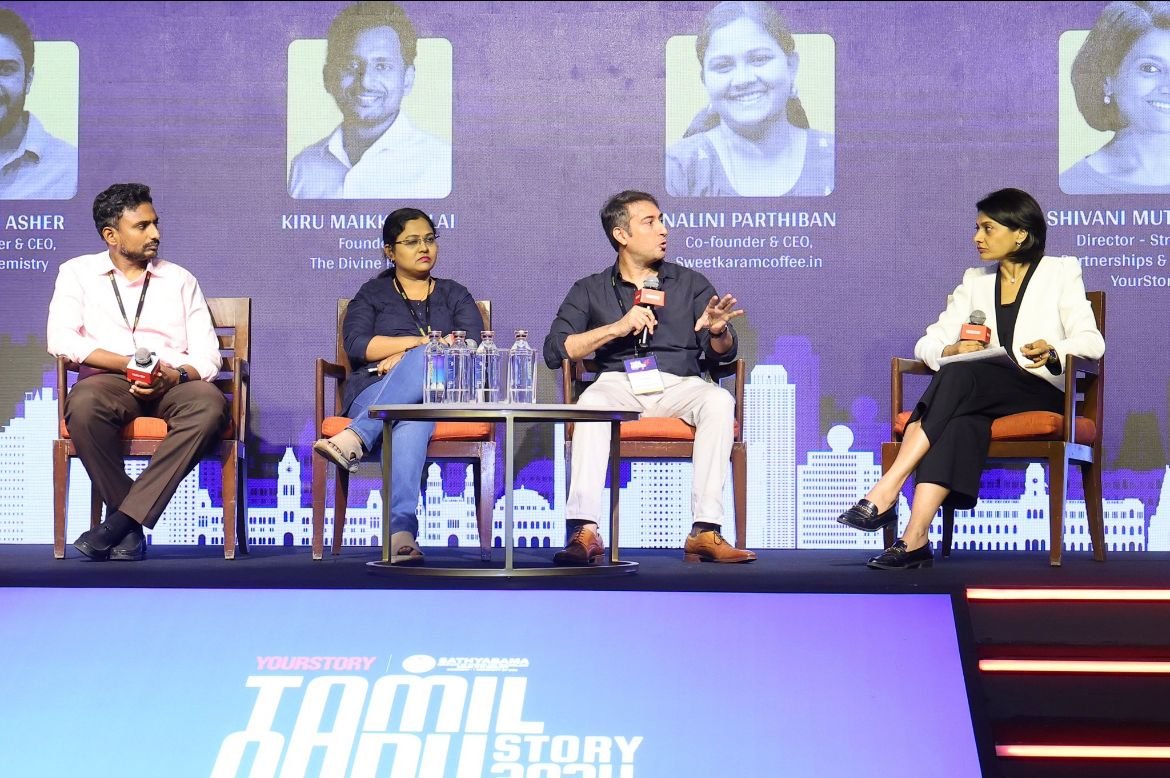[ad_1]
Building in India is going to be extremely exciting in the next 20 years, said Nalini Parthiban, Co-founder & CEO of D2C brand , at the third edition of Tamil Nadu Story 2024 in Chennai.
Speaking at a panel discussion on ‘Category-builders: D2C-ing from TN’, Parthiban said, while there were brands such as Haldirams and Bikaji in the north of the country, there was no unified brand from the south in the FMCG space. This gap led to the launch of Sweet Karam Coffee, which sells homemade traditional Indian sweets and snacks.
“As a brand, I think D2C (direct-to-consumer) has enabled us to think not just pan-India, but pan-global. And the proof of the results is in the various experiments that we did over the last one year, and we now have almost 70% of our base outside Chennai and Tamil Nadu,” she said, adding that the brand has grown about 5X in the last six months and ships about 40,000 orders a month.
Kiru Maikapillai, Founder, The Divine Foods, said D2C brands can operate from anywhere in the country.
“Once you have a strong supply chain, proper logistics, and a killer product, then you can do D2C from any part of the country, whether you’re from rural part of Kerala, from Mumbai, or from Delhi,” he said.
“Focus on the product, the location doesn’t matter,” he added.
The Divine Foods offers a range of superfoods and health products such as turmeric, moringa, millets, honey, and skincare.
Omni-channel strategy
Pritesh Asher, Co-founder and CEO, Juicy Chemistry, a beauty and personal care brand, believes adopting an omni-channel strategy is the way to go for D2C brands.
“You need to be closer to the customer,” he said, elaborating on how navigation has become more complex than it used to be and how one has to find ways of growing sustainably.
“It’s not only D2C today, it is omni-channel D2C. Your brand gets discovered online, but it gets built offline,” concurred Parthiban.
Clean choices
The three brands, Sweet Karam Coffee, Juicy Chemistry, and The Divine Foods, have built products in the conscious ingredients space.
Malakapillai said that, with the ‘Label Padega India’ movement, people have started reading the label on the backside to know about the ingredients used in the product.
“I believe this is going to be a very new normal … making conscious choices,” he said.
“This entire no palm oil revolution in snacking is actually picking up and people tend to call us healthy snacking. Although we don’t use it explicitly, people perceive us as (being in the) healthy snacking space and they feel it’s safe to give it to their kids,” said Parthiban.
She also said that taste is Sweet Karam Coffee’s primary differentiator, along with clean and locally-sourced products.
Elaborating on clean products, Asher said Juicy Chemistry has always focused on building trust with its customers since inception. Hence, the brand invested in certification.
“Trust, traceability, and transparency became the three pillars on which Juicy Chemistry was actually built,” he said.
Working with farmers and women
Asher spoke about starting off in Tamil Nadu, which was an added advantage with strong networking.
“For us, the ingredient story was very strong as well. We started finding ingredients not just from organic farmers, but (also) started sourcing from across the globe.”
Juicy Chemistry sources ingredients from almost 20 countries.
“We bring it to our own manufacturing facility, and that’s where it gets distributed across 12,000 pin codes and 20 different countries from India,” he said.
According to Maikapillai, finding farmers with organic certification was a challenge because the cost of certification is almost like the cost of one acre land.
“Farmers were practising organic (farming) without knowing they were practising organic because it’s kind of a traditional thing … which they do. So, the challenging part is identifying those farmers in each region,” he said.
Sweet Karam Coffee helps an entire ecosystem of small farmers and homepreneurs, providing opportunities to those who sustain these traditional delights.
“This entire network of scaling homepreneurs has been extremely gratifying, extremely fulfilling,” said Parthiban.
She also mentioned that almost 70% of the brand’s manufacturing comes from women entrepreneurs.
On raising funds
Advising founders on raising external funding, Parthiban said, “Keep it to a scale where you are confident that it will work. The moment you see customers love building, it’s time to start raising funds.”
[ad_2]
Source link





